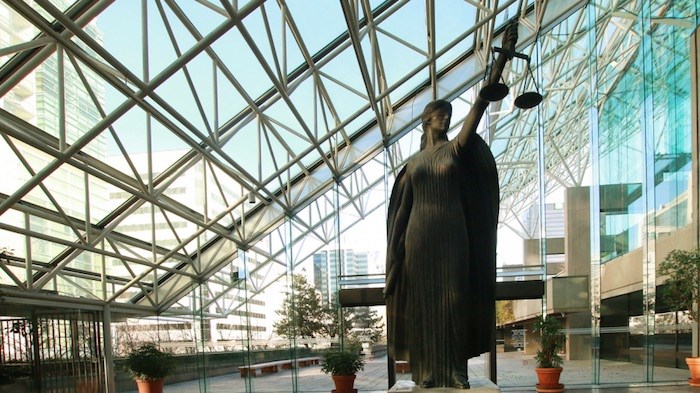A B.C. Supreme Court judge has awarded $1.4 million in damages — including more than $8,000 for psilocybin-based treatments — to a woman whose vehicle was struck outside a Victoria restaurant in 2018.
Shelley Ann Roy-Noel, 45, brought the case against the executors of the estate of Christopher Mark Buckle — the driver of the GMC Sierra truck that struck the Toyota RAV4 SUV that Roy-Noel had just parked outside a Wharf Street restaurant.
Court documents said Roy-Noel, a professional singer who had run a daycare she had to close after the accident, saw the truck in her rear-view mirror as she was exiting her vehicle.
Roy-Noel dove across her car seat to protect her grandmother, who was leaning forward in the passenger seat to retrieve her purse from the floor.
The impact knocked Roy-Noel forward and up, Justice David Crerar said in his May 7 decision.
“She first struck the left side of her head on the windshield and ceiling, and then on the driver’s side pillar,” said the ruling. “She has little recall of running after the truck and yelling at the defendant.”
Buckle was taken away in handcuffs, “smelling of alcohol,” said Crerar, adding Buckle died a year later, in circumstances unconnected to the collision.
The judge said Buckle’s executors — parents Mark Buckle and Dale Buckle — did not respond to the notice of civil claim, with ICBC the “de facto defendant.”
Crerar said the crash has inflicted “significant disability upon the plaintiff, rendering her a shell of her former vibrant, ebullient, enterprising, personable, nurturing, and active self.”
Roy-Noel claimed a mild traumatic brain injury from the impact, and said she suffers chronic pain; migraine headaches; debilitating light and sound sensitivity; tinnitus; hearing loss; dizziness and balance issues; blurred vision; scattered memory and concentration; brain fog; sleep disruption; nightmares; post-traumatic stress disorder; generalized anxiety disorder and major depressive disorder, among other effects.
“These conditions combine to create a state of near-permanent pain, lethargy, distraction, anxiety, and hopelessness,” the judge said. “While these symptoms are more or less constant, from time to time they particularly flare up, separately or in combination, such that she does not know whether or not she will be able to function on a given day.”
Crerar found the claims were largely supported and confirmed by the medical experts called by the plaintiff, and not significantly undermined by medical experts called by ICBC.
“ICBC counsel responsibly acknowledges that the plaintiff suffered significant physical and psychological injuries, which have rendered her incapable of working full time, and in need of significant medical and other interventions and treatments,” said the ruling.
Roy-Noel had sought $1.9 million, including $41,363 for psilocybin-based treatments and therapy for her lifespan. It’s a treatment she began after “her first dark spell of suicide ideation, in late 2018,” Crerar said.
The judge said Roy-Noel stopped a daily microdose in 2023 and was soon plunged back into suicidal thoughts, depression, and an even more diminished ability to manage her pain symptoms.
“She testified that her therapeutic use of psilocybin is critical for her ability to function,” the judge said.
He said that, based on evidence from a doctor and Roy-Noel, the psilocybin expense is reasonable, “if and as prescribed by a physician in compliance with Health Canada protocols.”
“It has literally been life-saving, in staving off her suicidal thoughts,” he said.
The award includes $8,042 for psilocybin (sometimes ingested as magic mushrooms) therapy.
Broken down, the main damages are:
• $902,500 for loss of future earning capacity;
• $220,000 in non-pecuniary damages;
• $367,916 for future care costs; and,
• $151,098 for past wage loss and loss of past earning capacity.



